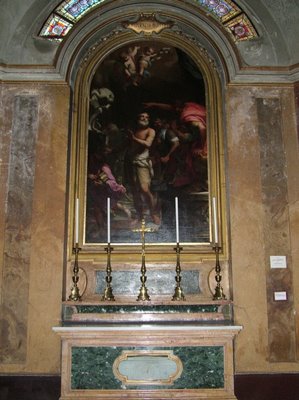
"So too, you also must be prepared, for at an hour you do not expect, the Son of Man will come."-Matthew 24:44
Collect (Opening Prayer)
Official Latin from the 1969 & 2002 Roman Missals
Orémus. Da, quaésumus, omnípotens Deus, hanc tuis fidélibus voluntátem, ut, Christo tuo veniénti iustis opéribus occurréntes, eius déxteræ sociáti, regnum mereántur possidére cæléste.
Per Dóminum nostrum Iesum Christum, Fílium tuum, qui tecum vivit et regnat in unitáte Spíritus Sancti, Deus, per ómnia saécula sæculórum.
Official 1973 I.C.E.L. Translation (Used at Mass in English)
Let us pray. All-powerful God, increase our strength of will for doing good that Christ may find an eager welcome at his coming and call us to his side in the kingdom of heaven,
where he lives and reigns with you and the Holy Spirit, one God, for ever and ever.
My Own Literal Translation
Let us pray. Grant this desire to Your faithful, we beseech You, Almighty God, that, running with just works to meet Your coming Christ, and having been gathered at His right hand, they may be made worthy to possess the Heavenly Kingdom.
Through our Lord Jesus Christ, Your Son, Who lives and reigns with You, in the unity of the Holy Spirit, one God, forever and ever.
Prayer Over the Gifts
Official Latin from the 1969 & 2002 Roman Missals
Súscipe, quaésumus, Dómine, múnera quæ de tuis offérimus colláta benefíciis, et, quod nostræ devotióni concédis éffici temporáli, tuæ nobis fiat praémium redemptiónis ætérnæ.
Per Christum Dóminum nostrum.
Official 1973 I.C.E.L. Translation (Used at Mass in English)
Father, from all you give us we present this bread and wine. As we serve you now, accept our offering and sustain us with your promise of eternal life.
Grant this through Christ our Lord.
My Own Literal Translation
Receive these gifts, we beseech You, O Lord, which, having been bestowed from Your kindness, we offer unto You, and that that which You grant to be accomplished for our temporal devotion, may become for us the reward of Your eternal redemption.
Through Christ our Lord.
Preface
Preface I of Advent - On the Second Coming of Christ
Official Latin from the 1969 & 2002 Roman Missals
Vere dignum et iustum est, æquum et salútare, nos tibi semper et ubíque grátias ágere: Dómine, sancte Pater, omnípotens ætérne Deus: per Christum Dóminum nostrum.
Qui, primo advéntu in humilitáte carnis assúmptæ, dispositiónis antíquæ munus implévit, nobísque salútis perpétuæ trámitem reserávit: ut, cum secúndo vénerit in suæ glória maiestátis, manifésto demum múnere capiámus, quod vigilántes nunc audémus expectáre promíssum.
Et ídeo cum Angelis et Archángelis, cum Thronis et Dominatiónibus, cumque omni milítia cæléstis exércitus, hymnum glóriæ tuæ cánimus, sine fine dicéntes:
Sanctus, Sanctus, Sanctus ...
Official 1973 I.C.E.L. Translation (Used at Mass in English)
Father, all-powerful and ever-living God, we do well always and everywhere to give you thanks through Jesus Christ our Lord.
When he humbled himself to come among us as a man, he fulfilled the plan you formed long ago and opened for us the way to salvation. Now we watch for the day, hoping that the salvation promised us will be ours when Christ our Lord will come again in his glory.
And so, with all the choirs of angels in heaven we proclaim your glory and join in their unending hymn of praise:
Holy, holy, holy ...
My Own Literal Translation
It is truly right and just, proper and availing unto salvation, that we always and everywhere give thanks to You, O Lord, Holy Father, Almighty and Eternal God: through Christ our Lord.
Who, in His first coming in the lowliness of assumed flesh, fulfilled the work of Your ancient arrangement, and opened to us the path to eternal salvation: so that, when He will come again in the Glory of His Majesty, we may then indeed openly take hold of that gift, a promise which we now dare to await with vigilance.
And so, with the Angels and Archangels, with the Thrones and Dominations, and with all the host of the Heavenly Army, we sing the hymn of Your Glory, saying without end:
Holy, Holy, Holy ...
Post-Communion Prayer
Official Latin from the 1969 & 2002 Roman Missals
Orémus. Prosint nobis, quaésumus, Dómine, frequentáta mystéria, quibus nos, inter prætereúntia ambulántes, iam nunc instítuis amáre cæléstia et inhærére mansúris.
Per Christum Dóminum nostrum.
Official 1973 I.C.E.L. Translation (Used at Mass in English)
Let us pray. Father, may our communion teach us to love heaven. May its promise and hope guide our way on earth.
We ask this through Christ our Lord.
My Own Literal Translation
Let us pray. May these frequented Mysteries be beneficial to us, we beseech You, O Lord, by Which You have just now established for us, who walk amidst the things which are passing away, to love Heavenly things and to cling to the things which will endure.
Through Christ our Lord.
RS




































